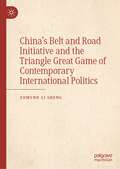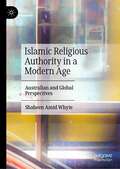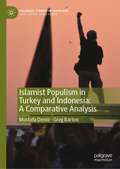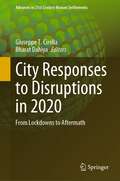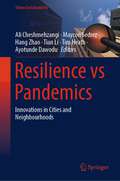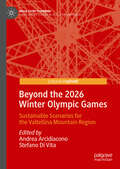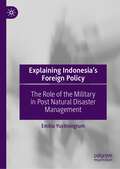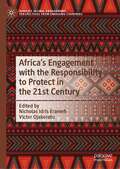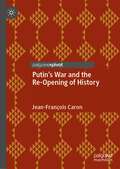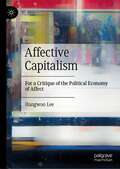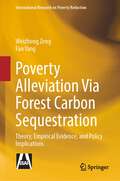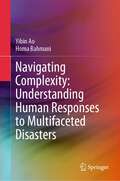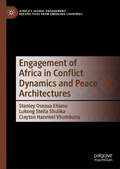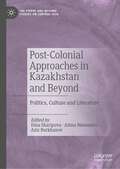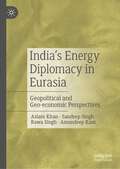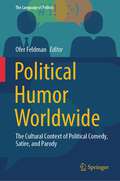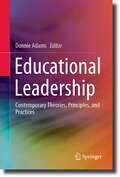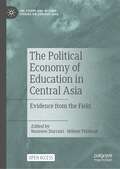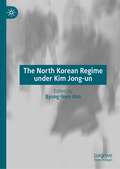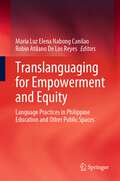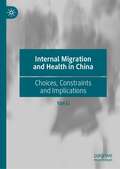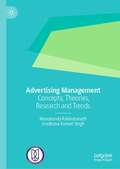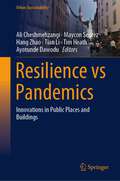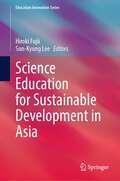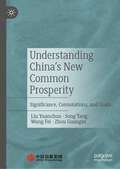- Table View
- List View
China’s Belt and Road Initiative and the Triangle Great Game of Contemporary International Politics
by Edmund Li ShengThis book focuses on the triangular relations between China, the United States and the European Union from the perspective of the Belt and Road Initiative (BRI) via the methodology of international political economy. China, the US and the EU are the three most important players in international politics and the global economy, and their relations are accordingly among the most influential in the global arena. This book will argue that the interactions between China, the US and the EU are highly dynamic given their close connections in trade, finance and many other economic fields. In the context of US–China competition, the decisions of the EU, which has sought to remain independent in its foreign policy for decades, crucially shape the landscape of international politics, and lucidly articulates how international relations look from China to scholars of geopolitics.
Islamic Religious Authority in a Modern Age: Australian and Global Perspectives
by Shaheen Amid WhyteThis book situates Australian Muslim experiences of religious authority within the global context of Islam in the modern world. While drawing on examples of Muslim-majority states, new empirical findings indicate the growing diversity of Muslim religious actors in Australia, as well as the contextual realities shaping the way religious authority is legitimised and contested in democratic and authoritarian environments. In particular, the study challenges homogenous articulations of Islamic religious authority in unearthing new voices, epistemologies and socio-political factors shaping Muslim attitudes and experiences of religious authority. The book fills important gaps in the field, such as intra-Muslim relations, female religious authority, digital Islam and the relationship between traditional ulama, reformists and Muslim intellectuals in the West.
Islamist Populism in Turkey and Indonesia: A Comparative Analysis (Palgrave Studies in Populisms)
by Mustafa Demir Greg BartonThis book focuses on the dynamics of democracy and populism in Muslim-majority countries, such as Turkey and Indonesia. It does so by examining the complexities of democratic development in these areas, ranging from 'flawed' to 'hybrid' regimes. Despite the aspirations for democratic progress, recent democracy indices reveal a concerning trend of backsliding, particularly in the last decade. This regression can be attributed, in part, to the ascendancy of populist politics.Populist movements have adeptly exploited both real and perceived cultural insecurities to acquire, consolidate, and maintain political power. This phenomenon is especially pronounced in flawed democracies and hybrid regimes within Muslim-majority countries, such as Turkey and Indonesia. Notably, religion, specifically Islam, has emerged as a central tool within the populist playbook. Populist actors have constructed a religious-civilizational framework that leverages political binaries, manipulates insecurities, and fosters traditional anti-elite and anti-'other' sentiments. In this book, the authors advance the notion that populism is a multifaceted phenomenon that relies on various pre-existing fractures within societies and cultures. Once in power, populism intensifies these differences to further consolidate its position, utilizing various state apparatuses such as state-controlled religious institutions. This comprehensive analysis offers insights into the growing trend of populism in the Muslim world and its impact on contemporary politics.
City Responses to Disruptions in 2020: From Lockdowns to Aftermath (Advances in 21st Century Human Settlements)
by Giuseppe T. Cirella Bharat DahiyaThis book presents the integrating of economics and urban geography to create a framework of cooperation around the idea of urban economic stability. It explores these disciplines through the economic lens and creates a collaborative environment for addressing the global challenges caused by the COVID-19 pandemic and future global shocks. Environmental advocates and proponents of economic growth are increasingly at odds—having looked at the economic impact of the decline of the environment as well as the environmental loss that occurs with unchecked growth and urbanization. The outbreak of the COVID-19 pandemic changed the global scene. The world shook in its foundations, as a number of countries’ lockdown affected not only the global economy but also society and the environment. The global community has seen the negative impact of COVID-19 on our economies. There have been steep declines in gross domestic product, job losses have been in the millions, and people have seen their incomes fall. An unplanned shutdown has taken its toll and has been a shock to the economies of the world. Past shocks and how they have impacted urban economies as well as for how long are core to bettering our understanding of present and future urban economic change. The underlying economic factors that make a shock more damaging to certain economies or industries, as well as understanding these vulnerabilities, help entities recover from economic shocks and allow them to better understand how impacts on individual businesses can be implemented. The pandemic revealed the need to adopt a global development approach, taking into consideration four dimensions: global value chains, debt, digitalization, and the environment. Topics related to the causation and lockdown are explored through a number of case studies from around the world.
Resilience vs Pandemics: Innovations in Cities and Neighbourhoods (Urban Sustainability)
by Ali Cheshmehzangi Maycon Sedrez Hang Zhao Tian Li Tim Heath Ayotunde DawoduThe COVID-19 pandemic and other highly transmissible diseases outbreaks have given a new significance to the concept of “resilience”, placing it in the spotlight of built environment-related studies. New directions have emerged from expanding on adaptive planning, urban layouts, urban morphologies, spatial planning, healthy cities, etc. To enhance resilience in the post-pandemic era, various theories, practices, and hypotheses are being formulated by scholars around the world.For this book project, we invite chapter proposals that provide forefront discoveries about the built environment resilience during and after the ongoing pandemic. Historical perspectives of resilience and other highly transmissible diseases are also relevant to understanding the COVID-19 issues. The authors are encouraged to elaborate on critical exploratory, innovative, and cutting-edge research approaches, highlighting the effects of COVID-19 and other highly transmissible diseases in the design, planning, and perception of the built environment. We aim to gather scientific experiences, reviews, analyses, discussions, recommendations, and solutions in the fields of urban planning, urban design, urban management, environmental science, architecture, etc.The book aims to document resilience-related innovations and new perspectives for the built environment, how people’s interactions adapt to new realities, and which mechanisms, tools, and strategies are required for such transformations in the following two scales of the built environments:(1) City/district; research on planning, commuting and mobility, politics, urban configurations, regulations, transmission and prevention, models, top-down processes, innovation processes, etc.(2) Community/neighborhood; research on collaboration, transmission and prevention, isolation and quarantine, social aspects, accessibility to services, technologies, education, policies, and innovative solutions.The book covers a wide range of studies, including physical and non-physical studies, which may refer to the city infrastructure, green/blue spaces, housing, policy-making, health services, social and economic issues, etc. The findings and results contribute to the decision-making of governments, organizations, and institutions, as well as inspire scholars and future research for developing resilience in the post-pandemic era.
Beyond the 2026 Winter Olympic Games: Sustainable Scenarios for the Valtellina Mountain Region (Mega Event Planning)
by Andrea Arcidiacono Stefano Di VitaThis volume offers a novel study of the Milan-Cortina's Winter Olympics 2026, with a focus on the mountainous region of Valtellina. It brings an up-to-date analysis of the complex interactions between mega-events and remote areas, both in terms of potentials for regeneration and risks for further segregation. Remote areas are traditionally characterized by socio-economic and spatial disparities. On the one hand, they benefit from attractive features, such as environmental and landscape resources, food and wine production, and energy production. On the other, they are by definition fragile environments, disrupted by the contradictions of international tourism, climate change, limited infrastructures and services, rural abandonment, and demographic decline.This book offers credible solutions for the sustainable development of mountainous regions as a legacy of Winter Olympics. It is an essential resource for scholars, professionals, and policy-makers in the fieldsof urban planning and design, architecture design, geography, sociology, and economics.
Explaining Indonesia’s Foreign Policy: The Role of the Military in Post Natural Disaster Management
by Emilia YustiningrumThis book examines Indonesia’s post-Aceh tsunami disaster management through the lens of a multifaceted foreign policy decision-making process involving a variety of bureaucratic actors. It argues that organizational structure and bargaining aspects are as important as power and interests in explaining foreign policy making in the Indonesian context. When the Aceh tsunami struck in late 2004, the use of foreign military assets in responding to natural disasters was not a common feature in Indonesian history—Jakarta remained reticent to engage foreign military enclaves within its own territories. This greatly affected Indonesia’s security cooperation with other countries, including Australia. Prior to the Aceh tsunami, natural disaster management was a domestic political issue. The unprecedented decision by the government of Susilo Bambang Yudhoyono to approve foreign military assistance for military operations other than war (MOOTW) in Aceh was a result of domestic and international factors. This book addresses timely yet fundamental questions about Indonesian foreign policy decision making that led to the involvement of foreign militaries in the country’s worst-ever natural disaster. As a former colony that prized the value of non-interference, the Indonesian government had to make a difficult decision about whether to accept offers of international assistance from countries including Australia. With this, the book explores why the Indonesian government decided to approve Australian humanitarian assistance following the 2004 Aceh tsunami, and how governmental agencies managed this assistance.
Africa's Engagement with the Responsibility to Protect in the 21st Century (Africa's Global Engagement: Perspectives from Emerging Countries)
by Nicholas Idris Erameh Victor OjakorotuThis book sheds light on the practice, challenges, and prospects of the Responsibility to Protect (RtoP) amidst wide contestation, backlash, operational challenges, and expectation gaps associated with the theory and practice of the RtoP. Diverging from existing works, it provides a renewed perspective and alternatives for future deployment of the RtoP and critical insights to the readers on how issues such as support, consolidation, and institutionalization within the broader context of regional dynamics of the RtoP can be best achieved in Africa. The book will be of particular interest to diplomats, international relations experts, scholars, RtoP advocates, the United Nations, and the African Union.
Putin’s War and the Re-Opening of History
by Jean-François CaronThis book explores the emerging politics of Eurasia from the vantage point of Kazakhstan. Vladimir Putin’s decision to invade Ukraine in February 2022 has led to the end of the post-Cold War paradigm of liberal convergence and has triggered a geopolitical shift that will lead to the establishment of a renewed bipolar world order. However, if Russia is responsible for that shift, it will most likely not be the power that will be the leading force of the anti-Western bloc. The leading force of this emerging bloc will rather be China to which Russia is inevitably destined to be relegated as a junior partner in Beijing’s geopolitical orbit. This book, analyzing the geopolitics of a changing region, will interest scholars of international relations, Eurasia, and the economics of energy.
Affective Capitalism: For a Critique of the Political Economy of Affect
by Hangwoo LeeDrawing on Tarde's and Deleuze’s monadology, this book investigates the affective turn of contemporary capitalism. The concept of affect provides critical insight to overcome the limitations of social constructivism and cognitive capitalism. Affective capitalism transforms the population’s everyday bodily experiences into quantitative metrics that can be observed, measured, and processed on a non-conscious register, turning them into dividuals prepared to react and be affected by specific information at a given moment. In an era where social wealth increasingly relies on the 'social factory,' algorithms and big data constitute the living labor beyond employment. This book argues that affect also holds a potential for dismantling today’s real subsumption of life by capital. The network effect, mostly actualized as a company's market capitalization, is constantly traversed by the molecular becoming of affect, leading to new assemblages, such as free software movement, decentralized platforms, peer-to-peer networking, blockchain, and universal basic income.
Poverty Alleviation Via Forest Carbon Sequestration: Theory, Empirical Evidence, and Policy Implications (International Research on Poverty Reduction)
by Weizhong Zeng Fan YangThis book focuses on two issues: the creation of benefits and opportunities for the poverty-stricken people and the trade-off between FCS and poverty alleviation. At the theoretical level, it explains the essential characteristics of PAFCS, analyses the impact mechanism of FCS projects in poverty alleviation, clarifies the stakeholders and their interests and demands, and delineates the dynamic mechanism of FCS projects and poverty alleviation. Based on this theoretical framework, the current situation and challenges for PAFCS in southwest China's ethnic areas are examined in depth. Project performance was quantitatively measured both for projects themselves and for community farmers. The research emphasises that FCS projects in poverty-stricken areas are not the same as PAFCS, highlights the combination of poverty alleviation theory and ecological compensation theory, and considers PAFCS as an intersection of poverty research and ecological compensation research. Additionally, theresearch suggested that FCS projects are not general poverty alleviation projects, highlights the need for full respect to be granted to the subjective will and value judgement of farmers, including poverty-stricken farmers, takes the lead in focusing on the win–win goal of combating climate change and reducing poverty, and makes a breakthrough in researching some key issues that need to be solved in the practice of PAFCS in the ethnic areas of Southwest China. This book is helpful for global scholars in the field of sustainable development, anti-poverty and forest carbon sequestration, government officials, and organisations in developing countries concerned with agricultural development, forestry economy, and sustainable development, as well as all the people around the world who want to find innovative solutions in the climate negotiations.
Navigating Complexity: Understanding Human Responses to Multifaceted Disasters
by Yibin Ao Homa BahmaniThis thought-provoking book unravels the intricate interplay between human behavior and disasters, weaving a rich narrative that transcends traditional boundaries. Embark on a captivating exploration of human responses to multifaceted disasters with this book. Unveiling the human psyche and the intricate web of emotions that intertwine with disaster events, this book offers a profound understanding of human responses to multifaceted disasters.Written with precision and meticulous research, this book captivates scholars, practitioners, and policymakers alike. Its multidimensional perspectives offer valuable insights for disaster management, urban planning, sociology, and public health, transcending disciplinary boundaries.
Engagement of Africa in Conflict Dynamics and Peace Architectures (Africa's Global Engagement: Perspectives from Emerging Countries)
by Stanley Osezua Ehiane Lukong Stella Shulika Clayton Hazvinei VhumbunuThis book examines the nature of conflict in Africa vis-à-vis the African Union (AU) peace and security architecture in Africa. It focuses on the intense campaign ‘Silencing the Guns by 2020’ since 2013, one of the flagship projects of Agenda 2063 to achieve a conflict-free continent by AU. It analyses various causes of conflict in Africa using case studies to pursue the causality and dynamics of these conflicts, which often point to the intersectionality of historical legacies of colonialism and neo-colonialism. It further examines the interplay of factors such as resource curse, resource exploitation, election-induced violence, political violence, incessant and interminable challenges of social justice, oppression, contemporary governance, and leadership dynamics. It also focuses on the application and integration of conflict and gender for analytical reflection. In the quest for a “Peaceful and secure Africa”, this book examines the different mechanisms to prevent, manage, and resolve conflicts on the continent, and the challenges thereof. It probes and investigates by asking critical questions about continental conflict dynamics and peace architectures which warrants in-depth inquiry and interrogation.
Post-Colonial Approaches in Kazakhstan and Beyond: Politics, Culture and Literature (The Steppe and Beyond: Studies on Central Asia)
by Dina Sharipova Alima Bissenova Aziz BurkhanovThis book explores the postcolonial discourse and decolonization processes in modern Kazakhstan and beyond. It pays particular attention to such areas as national and religious identity, language, literature, and historical narratives. Despite the fact that the post-colonial theory initially emerged in other regions of the world, it has increasingly been applied in the scholarship on Central Asia. Exploring recent debates on post-coloniality in Kazakhstan, this book is an attempt to bring together two bodies of scholarly literature: scholarship on culture and society in post-Soviet Central Asia and research on post-colonial theory. This volume will be of interest to scholars of Eurasian studies as well as researchers and students of post-colonialism in various contexts beyond Eurasia.
India’s Energy Diplomacy in Eurasia: Geopolitical and Geo-economic Perspectives
by Aslam Khan Sandeep Singh Bawa Singh Amandeep KaurThis book provides an accurate evaluation of re-integration of Eurasia in the context of India’s energy security and diplomacy which requires a normative shift as in the current Eurasian geopolitical and geo-economic matrix, the growing role of transit countries and their proximity with the Energy Complex Zone negates the fact that great powers or strong states control the Eurasian Heartland. Authors believe that wrecking this norm is fundamental here to deconstruct the undercurrents of energy geopolitics prevailing in Eurasia over the emerging phenomenon, as it discourages the re-integration of the Eurasian region. It explores how the geopolitical struggle between major powers for energy resources has been engendering mutual interdependencies between energy producers and transit countries. It makes an attempt to provide a transcontinental study of Eurasian energy and connectivity as a thrust area for the present work positioning Eurasia in Indian foreign policy, determining the contours of energy diplomacy in connection with the Eurasian energy policy. It defines Eurasia broadly as the region that encompasses Central Asia and the Caucasus including Russia and transit countries. It addresses the geopolitical and geo-economic aspects of Eurasian re-integration in the context of India’s energy security. The objective of this book is to combine theoretical, contemporary, and policy-oriented issues that deserve scholarly attention and would both complement and supplement the academic contributions.
Political Humor Worldwide: The Cultural Context of Political Comedy, Satire, and Parody (The Language of Politics)
by Ofer FeldmanThis collection of original chapters reflects the increasing interest over the past few decades in the relationship between political humor (as a distinct form of political discourse) and a country’s culture: Beliefs, values, norms, institutions, and processes that are affected, shaped by, and related to historical experiences, socialization processes, social structure, religion, the economic system, and majority/minority relations. Written by contributors from various fields of study – political science, communication, linguistics, sociology, culture studies, and political psychology – the book looks at the central role played by “culture” in shaping and affecting the sundry aspects of political humor, including satire and parody. The chapters, focusing on diverse countries such as the USA, UK, Greece, Philippines, Israel, Poland, Italy, and Spain, as well as ethnic groups, offer a comprehensive overview of political humor as used by public figures, including politicians, artists, performers, as well as comedians, talk shows hosts and the general public. By presenting fresh perspectives on the relationship between culture and political humor as employed during political debates in parliament, in media interviews and shows, on the internet and in art, the book opens up new avenues for discussion regarding the factors that shape political humor across the globe in a variety of political and media systems.
Educational Leadership: Contemporary Theories, Principles, and Practices
by Donnie AdamsThis book provides a rigorous grounding in contemporary educational leadership theories and their application to policy and practice globally across educational contexts. The book showcases contributions from authors with a deeply embedded understanding of educational leadership and in schools’ context. It will focus on major aspects of school leadership, including contemporary theories and models in the 21st century, the role of the principal, the work of senior and middle leaders, leadership, and student outcomes. Each chapter will engage with theory, policy, and practice, and draw on authors’ own research and with other empirical and conceptual sources.
The Political Economy of Education in Central Asia: Evidence from the Field (The Steppe and Beyond: Studies on Central Asia)
by Naureen Durrani Hélène ThibaultThis open access book is intended as an original contribution to the conversation on the role and challenges of education in Central Asia to promote social cohesion by looking at Kazakhstan, Tajikistan and Uzbekistan. Examining education challenges within the countries’ wider historical, social, political, and cultural context, the contributions explore existing discourses concerning national identity, religion, language, gender, inclusion, internationalisation of education, and non-state actors through a Political Economy Analysis (PEA) lens. With the understanding that education is both a powerful mechanism of social reproduction in societies and a driver of social change, the book attempts to promote political economy analysis of education as a helpful analytical tool for educational debates and reform agendas in the region and thus will be a valuable resource for policymakers, practitioners, and scholars in this region and beyond.
The North Korean Regime under Kim Jong-un
by Byung-Yeon KimThis edited book is one of the most updated and comprehensive accounts of the North Korean regime under Kim Jong-un’s era. It covers not only nuclear policies but also the political regime, the economy, society, and religion. It sets out to uncover multi-dimensional aspects of North Korea, explains how they have evolved, and predicts how they will proceed. It further investigates the extent to which his policies are different from his father’s and whether and why they have changed during the course. This book will be an invaluable reference for scholars, journalists and NGOs trying to make sense of the present and future of the Korean peninsula.
Translanguaging for Empowerment and Equity: Language Practices in Philippine Education and Other Public Spaces
by Maria Luz Elena Nabong Canilao Robin Atilano De Los ReyesThis book investigates how translanguaging is employed for pedagogical purposes and describes how speakers use translanguaging in specific multilingual contexts. It examines the beliefs and perceptions that shape translanguaging in different public spaces and interrogates the notion of translanguaging through the lens of various Philippine public spaces. This book also focuses on the breakthroughs that may be achieved through translanguaging in the academic field and other domains. It presents studies conducted in the Philippines, a multilingual and post-colonial setting where many multilingual speakers engage in translanguaging practices while recognizing the significance of each language in their communication repertoire in expressing their ideas and identities. It provides insights and knowledge on the current language practices in basic and tertiary education and offers more information about the crucial role of translanguaging in the government, media, and church domains in the Philippines. While this book mainly covers the use of translanguaging in various domains in the Philippines, it remains relevant to other multilingual societies around the world. Being a highly multilingual society, the Philippines serves as a global case study for understanding multilingualism. This book demonstrates how blocks to translanguaging may be overcome and explores possibilities that may be considered in introducing it as an effective pedagogical and communication tool. It emphasizes the importance of recognizing the translingual paradigm as a strong force that has been adopted by multilingual language users to promote empowerment and equity.
Internal Migration and Health in China: Choices, Constraints and Implications
by Yan LiThis book focuses on the multifaceted reality of social and health constraints and health services access among migrants in China, by originally exploring the social strata, social networks, and the understanding of health and health services among migrants. Furthermore, this book investigates the health constraints and health services access of rural-urban migrants in the absence of equal social protection by the government. It argues that the main obstacles to access health services are not only the shortage of financial resources among rural-urban migrants, but also lie in the institutional blindness regarding health security provision, rural-urban dualism and the household registration system in China. The book highlights the key function that social networks play in health and health services access among migrants in China, which has rarely been discussed in previous studies. And it also discusses the understanding of health among migrants, and further analyses that although many migrants have not formed proper understanding of the connotation of health and have limited knowledge of health, prime responsibility should not be put on the migrants because their poor understanding of health mainly results from their rural perspective while health and health services access depend on the social-economic environment in which they live and work.This book would be of interest to people in migration studies, social exclusion and social welfare studies and to people interested in rural-urban migration and health in China.
Advertising Management: Concepts, Theories, Research and Trends
by Manukonda Rabindranath Aradhana Kumari SinghThis book explores the concept of advertising and the different ways advertising is understood and evaluated. It dives deep into planning, designing, and executing advertising campaigns on different mediums. It discusses the theoretical and research parts of advertising by critically examining how over the years various hierarchical models and theories are developed by advertising experts.It examines various models and theories that explain why and how advertising is successful in persuading customers/target audiences to buy a product or accept an idea for behavioural change. It will help readers to understand the significance of advertising and consumer psychology which has a critical role in purchasing a product or an idea.
Resilience vs Pandemics: Innovations in Public Places and Buildings (Urban Sustainability)
by Ali Cheshmehzangi Maycon Sedrez Hang Zhao Tian Li Tim Heath Ayotunde Dawodu“Resilience vs Pandemics: Innovations in Public Places and Buildings” explores innovative solutions for architecture and public places during and after the pandemic. Additionally, the authors contribute to the documentation of architectural and social transformations that have been prompted by previous transmissible diseases, as this knowledge can inform responses to future pandemics. In this volume, the chapters present critical, exploratory, multi- and interdisciplinary, and cutting-edge research approaches; with a particular focus on the effects of COVID-19 and other highly transmissible diseases on the design, use, performance, and perception of the built environment, particularly at the building scale. This volume aims to organize a collection of scientific studies, reviews, analysis, recommendations, and solutions in the fields of urban design, architecture, design, landscape design, etc. The overarching goal is to document new approaches to create and enhance built environment resilience. Chapters shed light on novel methods, tools, processes, regulations, behaviours, and other relevant details contributing to a comprehensive understanding of this crucial issue. The two scales of the built environment under consideration are: (1) Public Places, including research on transformations (death, emergencies, changes), requirements, adaptability, usability, virtual immersion, historical perspectives, interactivity, shifts in use and programs, etc.(2) Buildings, including regulations, shifts in use and program, non-pharmaceutical interventions, human interactions, and human-machine interfaces. The book covers a wide range of studies, including physical and non-physical studies, which may refer to the city infrastructure, green/blue spaces, housing, policy-making, health services, social and economic issues, etc. The findings and results of various global case study examples contribute to the decision-making of governments, organizations, and institutions, as well as inspire scholars and future research for developing resilience in the post-pandemic era.
Science Education for Sustainable Development in Asia (Education Innovation Series)
by Hiroki Fujii Sun-Kyung LeeThis book presents an Asian perspective on transformative science education in the context of the United Nations' Sustainable Development Goals (SDGs). The chapters are written by contributors who practiced science education for sustainability in a research project entitled “Teacher Education for ESD in the Asia-Pacific Region” from 2017 to 2019, supported by the Japan Society for the Promotion of Science, and the Japanese National Commission for UNESCO. The book showcases the contributors’ innovations in science education for sustainability, presenting case studies of science teaching and learning, science curriculum and assessment, science education in collaboration with local communities, and science teacher education. Embodying Asian sustainability education paradigms, policies, and practices, these case studies depict the diversity and uniqueness of natural, social, and cultural contexts in Asia, while demonstrating their commonalities. Through examining these case studies, this book aims to provide examples for praxis, and prospects, for new science classes, curricula, and teacher education in implementing education for sustainable development.
Understanding China's New Common Prosperity: Significance, Connotations, and Goals
by Liu Yuanchun Song Yang Wang Fei Zhou GuangsuThis book explains China's new common prosperity policies—their significance, connotations, and goals—and explains the economic logic behind these often misunderstood policies. First, the authors explain the theory behind common prosperity. Why is the Chinese government changing its economic policies now, and what is its objectives and metrics? The authors then go on to explain how the new policies are being designed, what the test cases are across the country, and how the government, businesses, families, and individuals are working together to promote common prosperity. An important book that will help scholars around the world understand China's new economic bottom line. This book will be of interest to economists, sociologists, and sinologists.
